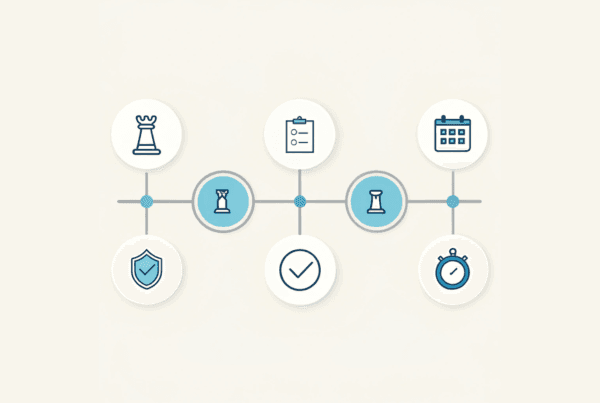
The decision to partner with a private equity firm is one of the most significant in your career. After the initial presentations and Letters of Intent, you enter the most intensive phase of the entire process: due diligence. This period of intense scrutiny can feel intimidating, but it doesn’t have to be.
This detailed checklist is a direct follow-up to our foundational Guide to PE in Healthcare. Think of it as your strategic roadmap for the due diligence phase of the PE transaction timeline. With the right preparation, you can transform due diligence from a stressful hurdle into an opportunity to validate your practice’s value and build buyer confidence.
Why the Due Diligence Checklist Matters So Much
A private equity buyer’s primary goal during due diligence is to verify your claims and identify potential risks. They need to be certain the business is as healthy as it appears on paper. For you, the seller, a well-organized and transparent due diligence process achieves three critical goals:
1. It Validates Your Valuation: Clean, organized data confirms the financial and operational health that your initial valuation was built upon.
2. It Builds Buyer Confidence: A smooth process signals a well-run practice, which reduces the buyer’s perception of risk and can prevent last-minute attempts to lower the price.
3. It Speeds Up the Timeline: Being prepared drastically reduces the back-and-forth, helping you get to the closing table faster.
During this phase, the buyer will bring in a team of experts. Having your own advisors, including specialized legal counsel and experienced CPA firms, is essential to level the playing field.
The Comprehensive Due Diligence Checklist
A buyer’s request list can seem endless. We’ve organized it into five core categories that PE firms focus on. Use this as your guide to assemble your virtual data room.
1. Financial & Corporate Health
This is the bedrock of your valuation. The buyer will dig deep to understand every aspect of your financial performance and corporate structure. A detailed financial due diligence guide is invaluable here, as is preparing for a formal Quality of Earnings (QoE) Analysis.
What You’ll Need:
* Financial Statements: Income statements, balance sheets, and cash flow statements for the last 3-5 years, plus year-to-date monthly statements.
* Tax Returns: Corporate tax returns for the last 3 years.
* Accounts Receivable: Detailed A/R aging reports and write-off history. A low “days in A/R” metric is a strong positive signal.
* Revenue & Payer Mix: A breakdown of revenue by CPT code, by provider, and by payer. This helps buyers understand your revenue streams and any concentration risks. You can read more on the impact of payor mix on valuation.
* Debt & Liabilities: A schedule of all outstanding debt, loans, and lines of credit.
* Corporate Records: Articles of Incorporation, operating agreements, shareholder lists, and board meeting minutes.
2. Clinical & Operational Integrity
Strong financials are great, but a PE buyer needs to know that the operational engine driving those numbers is sound and scalable. This data proves your success is repeatable.
What You’ll Need:
* Patient & Visit Data: Monthly patient visit volumes by provider and location for the last 24-36 months.
* Provider Productivity: Reports on Relative Value Units (RVUs) or other productivity metrics per provider, benchmarked against specialty standards.
* Referral Patterns: Data on top referral sources to show the stability of your patient pipeline.
* Revenue Cycle Management (RCM): Copies of all major payer contracts and fee schedules, along with denial and appeals rate analysis for the last 12-24 months.
* Clinical Quality: Any reports on clinical outcomes, quality metrics (e.g., MIPS), and patient satisfaction surveys.
3. Legal & Regulatory Compliance
In healthcare, nothing can sink a deal faster than a compliance issue. A pristine regulatory record is non-negotiable. Any uncertainty here presents a massive risk to the buyer.
What You’ll Need:
* Licensure & Accreditation: Copies of all current state and federal licenses, accreditations, and certifications for both the practice entity and all clinical providers.
* Compliance Programs: Documentation of your HIPAA, OSHA, and billing compliance programs, including records of staff training.
* Audits & Investigations: A summary of all past audits (from CMS, commercial payers, etc.) and any past, pending, or threatened litigation.
* Malpractice History: A report of all malpractice claims (both open and closed) against the practice or its providers.
* Key Regulations: Be prepared to discuss your adherence to federal laws like the Stark Law and Anti-Kickback Statute. Learn more by navigating Stark Law & Anti-Kickback regulations.
4. People & Contracts
A practice is its people. Buyers scrutinize your team’s structure and the agreements that govern your business relationships to understand the stability and potential liabilities they are inheriting.
What You’ll Need:
* Employee Roster: A complete list of all employees (W2 and 1099), including their role, tenure, and current compensation.
* Employment Agreements: All signed employment contracts, especially for physicians, which should be reviewed with our Physician Employment Contracts Guide. Pay close attention to non-compete and non-solicit clauses.
* Benefit Plans: Summaries of all employee health, retirement, and other benefit plans.
* Vendor & Lease Agreements: Copies of all significant contracts with suppliers, IT providers, billing companies, and of course, all real estate leases or ownership documents.
5. Technology & Systems
Your technology infrastructure is the backbone of your operations. A buyer will assess whether your current systems are a scalable asset or a liability that requires immediate investment.
What You’ll Need:
* EHR/EMR Information: Details on the system you use, its compliance with interoperability standards, and its capabilities.
* IT & Software: An inventory of all critical software, including license agreements and IT support contracts.
* Data Security: Documentation of your cybersecurity protocols, data backup procedures, and any history of data breaches. Understanding potential technology & EMR integration challenges is key here.
Beyond the Data Room: Site Visits and Interviews
Due diligence is not just a document exchange. Expect the buyer’s team to request a site visit to see your facilities and observe your workflow firsthand. They will also want to conduct interviews with key physicians and senior administrative staff. This is their chance to assess the culture, the leadership team, and the operational realities that don’t show up on a spreadsheet.
Common Red Flags That Derail Deals
Being proactive is your best defense. If your practice has any of these common issues, it’s far better to address them before the due diligence process begins.
- High Provider Dependence: If the practice’s success hinges on one or two owners, buyers see significant risk. You can mitigate this by having associate physicians well-integrated with strong employment contracts.
- Messy Financials: Inconsistent or poorly documented financials are a major red flag. Work with a professional to clean up your books and perform a pre-sale EBITDA normalization to present a clear picture of profitability.
- Lack of a Compliance Program: Not having a documented HIPAA or billing compliance program is unacceptable to institutional buyers.
- Unfavorable Payer Mix: Heavy reliance on a single government or commercial payer can be seen as a concentration risk.
Your Path Forward
Gathering this information is a significant undertaking. This checklist provides the “what,” but executing requires dedicated time and expertise. At SovDoc, our Practice Preparation services are designed to manage this entire process for you. We help you build a professional data room and anticipate buyer questions, ensuring you present your life’s work in the best possible light.
If you are ready to understand how your practice stacks up, contact us today for a confidential assessment.
Frequently Asked Questions
What documents do I need to prepare for PE due diligence when selling my healthcare practice?
You should assemble comprehensive financial statements (income, balance sheets, and cash flow) for the last 3-5 years, corporate tax returns, detailed accounts receivable reports, revenue and payer mix breakdowns, corporate records like Articles of Incorporation, and debt schedules. Additionally, gather clinical operational data, legal licenses and compliance documents, employment agreements, vendor contracts, and technology system info.
What are the main areas private equity firms focus on during due diligence for a medical practice?
PE firms focus on five key areas: 1) Financial & Corporate Health, including detailed financials and corporate documents; 2) Clinical & Operational Integrity, covering patient volumes, productivity metrics, and revenue cycle management; 3) Legal & Regulatory Compliance, like licensing and regulatory audits; 4) People & Contracts, which includes employment agreements and vendor contracts; and 5) Technology & Systems, assessing EHR/EMR and data security.
How can I prepare my practice to avoid common due diligence red flags?
Address high provider dependence by having well-integrated associate physicians and clear succession plans. Clean up financials professionally and perform EBITDA normalization before the sale. Establish a documented compliance program for HIPAA and billing. Avoid heavy reliance on a single payer by diversifying your payer mix. Early disclosure and remediation plans for any regulatory issues also help prevent red flags.
Who is typically involved in the due diligence process of selling a healthcare practice to a PE firm?
The buyer typically brings in a team of experts including their bankers, legal counsel, and financial advisors. As the seller, you should also assemble your own team of advisors, including specialized legal counsel and experienced CPA firms, to support and balance the scrutiny process during due diligence.
What should I expect beyond document review during the due diligence process?
Beyond assembling documents, expect site visits where the buyer assesses the clinical and operational environment in person. They will conduct interviews with key physicians and administrative leaders to evaluate leadership, culture, and operational realities. Preparing your team and facility in advance for these visits and interviews is crucial.



